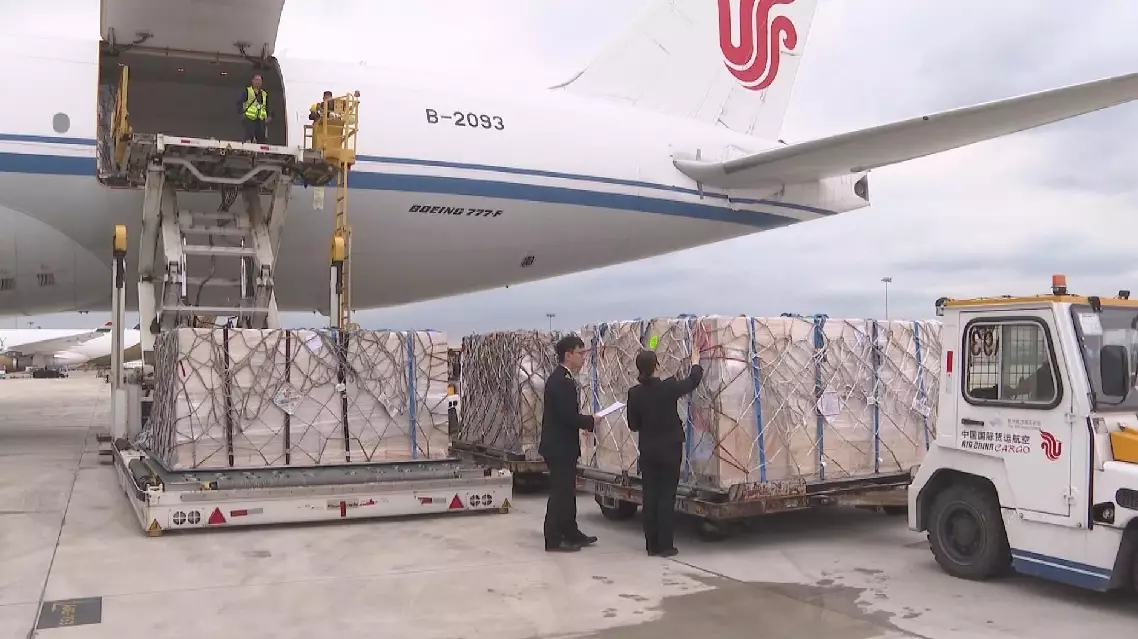Chinese authorities announced Thursday a set of measures to further enhance the efficiency of customs clearance and passenger transit at the nation's airports.
Jointly issued by the General Administration of Customs, the National Immigration Administration, and the Civil Aviation Administration of China, the measures focused on accelerating the flow of both cargo and passengers through China's major air hubs.
The measures involve the optimization and expansion of 24/7 customs clearance systems at major airports in key regions, including the Beijing-Tianjin-Hebei region, the Yangtze River Delta region, the Guangdong-Hong Kong-Macao Greater Bay Area, and the Chengdu-Chongqing area.
The measures also aim to strengthen the "Air Silk Road" initiative, which was launched in 2014 to operate air freight services along multiple routes between China and Europe.
In addition, pilot programs will be carried out for direct loading of export cargo and direct pickup of imported cargo at eligible airports.
On the passenger side, the measures include promoting electronic quarantine inspections for international flights. At eligible airports, measures aimed at facilitating border inspection procedures will be steadily implemented for passengers going through a 24-hour visa-free transit and for crew members in direct round trips.
The measures also encourage efforts to explore pilot programs for "dual pre-inspection" of both carry-on and checked luggage for inbound travelers.
To boost the development of key aviation hubs, the measures encourage airlines to increase the deployment of all-cargo aircraft, and to increase the frequency of regular international all-cargo routes.
The measures support the "one-ticket-to-the-end" services for international flights that include transits within China.

China introduces new measures to enhance airport clearance efficiency
China's National Development and Reform Commission (NDRC) will work with relevant departments and local authorities to take concrete steps to promote the implementation of the newly passed private sector promotion law, a landmark legislation concerning a vast economic force in the country, said an NDRC official.
China's top legislative body -the National People's Congress - passed the private sector promotion law on Wednesday, establishing a legal backing for the steady and healthy growth of the key sector, including more than 57 million private firms and over 100 million self-employed individuals.
This landmark law is China's first fundamental legislation dedicated to the private sector. It will bolster confidence among the vast community by improving the business environment, fostering innovation, and ensuring fair competition, according to NDRC, the country's top economic planner.
"The private sector promotion law has actively responded to the key concerns in the development of the private sector. Efforts are made to establish and improve relevant systems and enhance the enforceability of the systems, from ensuring fair competition, improving investment and financing environment, supporting technology innovation, focusing on regulated operation, optimizing services and guarantees, and improving rights and interest protection, to strengthening legal accountability, so as to ensure that all forms of ownership can equally utilize production factors by the law, participate in market competition fairly, receive equal legal protection, further unleash their complementary advantages, and pursue common development," said Liu Min, deputy director of Private Sector Development Bureau under NDRC.
Liu added NDRC will continue to work together with relevant departments and local authorities to improve supporting systems and mechanisms and take concrete steps to promote the implementation of the private sector promotion law.
"We will make continuous and increasing efforts to remove barriers to market access and to fair competition, to address the issue of overdue payments to private enterprises, to protect the lawful rights and interests of private businesses and entrepreneurs by the law, to implement various relief policies, to help private enterprises shoulder their responsibilities of the era, so as to help translate legal systems into concrete actions and tangible outcomes that promote the high-quality development of the private sector," said Liu.

Concrete steps to take for firmly implementing China's landmark private sector promotion law: official





















































